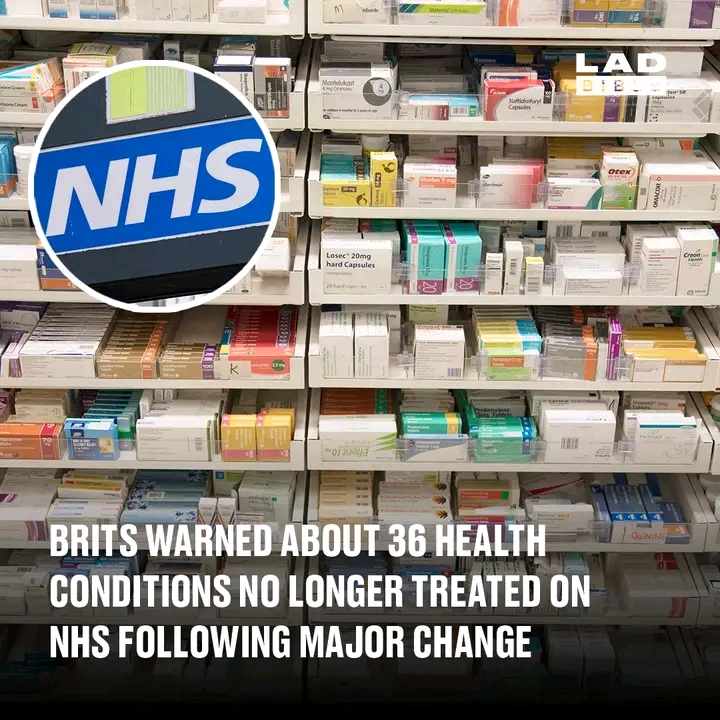
In recent years, the UK’s National Health Service (NHS) has been under immense pressure due to rising demand for services, an aging population, and budgetary constraints. To cope with these challenges, the NHS has had to implement a range of reforms and cost-saving measures, some of which have led to significant changes in the type of treatments offered to patients. Among the most controversial of these changes is the list of health conditions no longer routinely treated by the NHS. In a move that has alarmed many, the NHS has announced that 36 health conditions will no longer be automatically covered for treatment, leaving patients to look for alternative options or pay for private care.
This blog post delves into these changes, exploring the reasons behind them, the conditions affected, and the potential implications for both patients and the healthcare system. With public reaction ranging from concern to frustration, understanding this shift in NHS policy is crucial for anyone who relies on the service for their healthcare needs.
Why the NHS is Making These Changes
The NHS, which has long been a cornerstone of the British healthcare system, is facing a growing crisis due to factors such as budget cuts, an overstretched workforce, and an ever-increasing demand for medical services. According to recent reports, the NHS is experiencing record waiting times, staff shortages, and rising costs. These challenges have prompted healthcare leaders to rethink how resources are allocated and to identify areas where treatment can be streamlined or limited to prioritize the most urgent cases.
The decision to limit or eliminate funding for certain health conditions is a part of a broader effort to reduce unnecessary spending and ensure that resources are focused on the most critical needs. The NHS argues that this shift will allow them to allocate funds more efficiently and ensure that those with the most serious or life-threatening conditions receive the care they need.
However, the decision has not been without controversy. Many believe that these changes could lead to significant inequalities in healthcare access, with patients who can afford private treatment having a distinct advantage over those who cannot. Others argue that the decision to no longer treat certain conditions could lead to longer-term health problems, placing additional strain on the system as untreated conditions worsen.
The 36 Health Conditions Affected
The 36 conditions no longer treated by the NHS are varied, covering a wide range of non-emergency health issues. These are conditions that, according to NHS officials, can be managed through self-care, lifestyle changes, or non-prescription treatments. For many, this marks a significant change in the way the NHS addresses less urgent health problems, as patients will no longer be able to rely on state-funded medical care for treatment. Below is a detailed overview of the 36 conditions affected by the new policy:
- Minor Arthritis and Joint Pain
Arthritis, particularly in its mild or early stages, will no longer be automatically treated by the NHS. Instead, patients will be encouraged to manage their condition through exercises, physiotherapy, and over-the-counter pain relief.
- Cold Sores
Cold sores, which are caused by the herpes simplex virus, will not be routinely treated by the NHS, as they are generally self-limiting and can be managed with antiviral creams or over-the-counter treatments.
- Back Pain (Mild to Moderate)
Non-severe back pain, particularly that caused by posture or lifestyle factors, will no longer receive routine NHS treatment. Patients will be advised to seek physiotherapy and make lifestyle adjustments.
- Infected In-grown Toenails
Infections from in-grown toenails are generally not considered an urgent medical concern unless they are causing severe discomfort. NHS services will no longer routinely treat these, except in more serious cases.
- Obesity Management
While NHS services will still provide support for individuals with morbid obesity (BMI over 40), routine weight management programs for those with less severe obesity may no longer be funded.
- Varicose Veins
Treatments for varicose veins, particularly when they are not causing pain or other significant symptoms, will be restricted. People will be encouraged to manage the condition through self-care and lifestyle changes.
- Snoring and Sleep Apnea (Non-Severe)
Patients experiencing mild snoring or sleep apnea may no longer be eligible for NHS treatments unless the condition is causing significant health risks, such as heart problems or severe daytime fatigue.
- Recurrent Infections of the Skin
Infections like impetigo or mild fungal infections that can be treated with over-the-counter medication may no longer receive NHS funding, as they are not seen as requiring urgent or long-term medical care.
- Uncomplicated Hemorrhoids
Mild hemorrhoids that can be treated with over-the-counter treatments or lifestyle changes may no longer be eligible for NHS intervention.
- Hair Loss (Alopecia)
Alopecia treatments, including prescription medications and treatments for male-pattern baldness or mild hair thinning, will no longer be provided as a routine service by the NHS.
- Skin Conditions (e.g., Eczema, Mild Acne)
Non-severe cases of eczema and acne may no longer receive NHS treatment. Patients will be advised to use over-the-counter treatments or make lifestyle changes to manage their conditions.
- Minor Burns or Scalds
Minor burns or scalds that can be managed with basic first aid and over-the-counter treatments may not be covered under the NHS.
- Mild Digestive Disorders
Conditions like mild indigestion, bloating, and heartburn will no longer be routinely treated by the NHS unless they are linked to more severe health conditions.
- Constipation
Routine treatments for chronic but mild constipation will be removed from NHS coverage, with patients encouraged to manage their condition through dietary changes and over-the-counter medications.
- Cystitis
Mild cases of cystitis (urinary tract infections) will no longer automatically receive NHS treatment unless there are significant complications or underlying health risks.
- Irritable Bowel Syndrome (IBS)
Mild or intermittent cases of IBS that can be managed through dietary adjustments and lifestyle changes will no longer receive routine NHS intervention.
- Menstrual Cramps (Dysmenorrhea)
Treatment for mild menstrual cramps, which can be effectively managed with over-the-counter pain relief, will no longer be available through the NHS.
- Urinary Incontinence (Mild Cases)
Mild urinary incontinence, particularly in older adults, may no longer receive NHS funding unless more severe or life-altering symptoms are present.
- Minor Eye Conditions (e.g., Dry Eyes)
Conditions like mild dry eyes or simple conjunctivitis (pink eye) will no longer receive routine treatment unless they are linked to more serious conditions.
- Minor Dental Issues
Non-severe dental issues such as toothache, cavities, or gingivitis may no longer be covered by the NHS unless they require surgical intervention or are causing significant health risks.
- Recurrent Sinus Infections
Frequent but mild sinus infections may no longer receive treatment through the NHS, as these can often be managed with over-the-counter decongestants and lifestyle changes.
- Minor Mental Health Conditions (Mild Depression or Anxiety)
Non-severe cases of depression or anxiety, which can often be managed through therapy or self-help techniques, may no longer be treated by the NHS without evidence of serious health risks.
- Mild Migraines
Treatment for mild migraines or tension headaches, especially if they occur infrequently, may no longer be covered by the NHS.
- Minor Sprains and Strains
Mild musculoskeletal injuries like sprains or strains that can be managed with rest and over-the-counter treatments may not receive routine care from the NHS.
- Menopause Symptoms
Mild menopause symptoms, such as hot flashes or mild mood changes, may no longer receive routine treatment, though more severe cases requiring hormone therapy may still be covered.
- Overactive Bladder
Mild cases of overactive bladder or frequent urination may no longer receive routine NHS treatment, with patients encouraged to manage the condition through lifestyle changes.
- Insomnia
Mild insomnia may no longer be treated through the NHS unless it is connected to a more serious underlying health condition.
- Mild Asthma
Routine treatment for mild asthma, which can often be controlled with over-the-counter inhalers, may no longer be covered by the NHS.
- Minor Allergies
Non-severe allergies, such as hay fever, that can be treated with over-the-counter antihistamines may not receive NHS funding.
- Mild Headaches
Routine treatment for mild headaches, particularly those caused by tension or stress, will no longer be covered by the NHS.
- Acne (Non-Severe)
Mild acne and other minor skin conditions that can be treated with over-the-counter creams will not be routinely treated by the NHS.
- Minor Sleep Disorders
Sleep disorders that are not causing significant disruption to daily life may no longer be treated by the NHS.
- Excessive Sweating (Hyperhidrosis)
Mild cases of hyperhidrosis (excessive sweating) will not be treated by the NHS unless they are severe enough to cause significant quality-of-life issues.
- Mild Hearing Loss
Non-severe hearing loss will no longer be treated by the NHS unless it is linked to a more serious condition or injury.
- Non-Severe Psoriasis
Treatment for mild psoriasis will no longer be covered, with patients encouraged to manage the condition through over-the-counter treatments.
- Minor Weight Management Issues
For individuals with a BMI slightly over the normal range, NHS-funded weight management programs may



